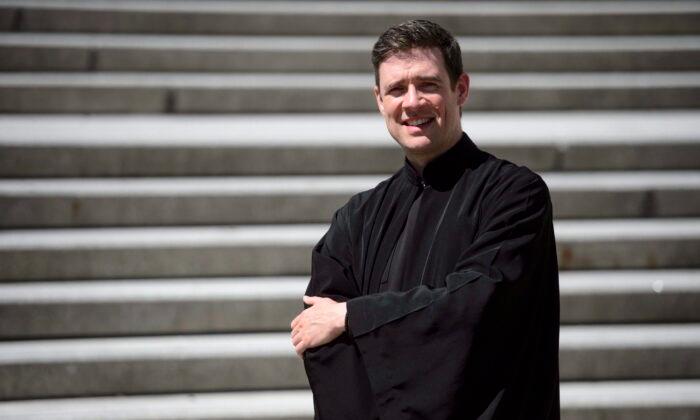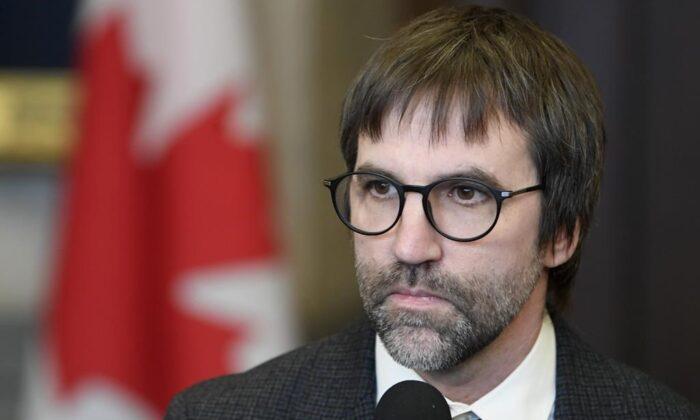Beijing’s actions in Hong Kong should be concerning for all Canadians, as well as all free peoples, says MP Garnett Genuis, the Conservative shadow minister for Multiculturalism & Canada-China.
Beijing’s subjugation of Hong Kong by imposing a draconian national security law on the autonomous region has global implications, and represents “what is likely to be the most important conflict/contest of the 21st century,” Genuis said at a webinar on Sept. 22.
“Hong Kong provides the key to the whole world in terms of the challenges and conflicts that now confront us in the 21st century,” he said.
“What Hong Kong helps us do is understand the nature of the conflict between countries like ours and the PRC.”
The Macdonald-Laurier Institute (MLI), an Ottawa-based public policy think tank, hosted the webinar titled “Hong Kong—A Way Forward: How the Free World Will Respond to Beijing’s Crackdown” to discuss how democractic nations should respond to the deteriorating situation in Hong Kong.
Among those on the panel were Dr. Miles Yu, China Policy Adviser to U.S. Secretary of State Mike Pompeo; Lord Chris Patten, last Governor of Hong Kong and Chancellor of Oxford University; and Nathan Law, one of Hong Kong’s most well-known democracy activists and a founding member of Demosistō, a new pro-democracy political party.

The Chinese regime has drawn international condemnation in recent months for imposing the national security law on Hong Kong, effectively ending the “one country, two systems” arrangement, while arresting protesters en masse. Signed into law on June 30, the legislation stipulates punishment up to life in prison for acts of subversion, terrorism, and “collusion with foreign forces.” It also calls for the creation of a security agency in Hong Kong under the direct control of Beijing.
Beijing’s actions in Hong Kong should be concerning for all countries, said Genuis, who is also co-chair of the Inter-Parliamentary Alliance (IPAC) on China, because of “the universal jurisdiction that is claimed through the national security law.”
In theory, in addition to the 300,000 Canadians living in Hong Kong, any Canadian who travels to or transits through Hong Kong are at risk of being arbitrarily detained under the law if they’ve said or done anything that could anger Beijing, several experts told IPAC last month before the committee was shut down when Parliament was suspended. There is also no certainty as to what would be considered a violation of the law.
“Canadian citizens living in Canada report significant intimidation by the government of China and actors who they back when those people are speaking out about issues of justice and human rights and rule of law in Hong Kong,” Genuis said.
“This raises the very real concern that Canadians, even legislators, could face charges under the national security law, be picked up in Hong Kong or extradited from other countries.”
Law said the security law is used as a tool for obvious crackdowns on democracy activists in Hong Kong but also has a subtler aim of censoring democratic institutions that form the cornerstone of civil society.
“By having the law in place, a lot of institutions could quote the law to suppress the freedom of expression of the individuals in that institution,” he said, citing academic and press freedom as examples.
Mareike Ohlberg co-author of “Hidden Hand: Exposing How the Chinese Communist Party Is Reshaping the World,” said the legislation’s Article 38—which says the rules also apply to infractions that occur anywhere outside Hong Kong, committed by foreign citizens—means “theoretically every person in every country is affected by this law.”
“People simply have to understand that what the CCP has done here in Hong Kong should have important lessons for them,” she said, adding it should serve as a cautionary tale for governments that seek to engage or negotiate with the Chinese regime.
“They have to understand what this step really means. ... This really means they’re dealing with someone who is fundamentally untrustworthy and that they’re going to be breaking promises, and even international treatises that they’ve made.”

Ohlberg said Canada’s response to China’s bad behaviour has been relatively muted so far, noting that business interests and elites “who want to look the other way” tend to hinder concrete action.
“It’s just been very convenient in many ways, financially helpful and financially beneficial for people to look the other way and to pretend that this isn’t happening as long as it is happening to someone else,” she said.
Genius says there are several ways Canada should respond to Beijing’s aggression in Hong Kong: Protect Canadians through legislation that deals with foreign interference and combats Beijing claim of universal jurisdiction; prioritize “justice, human rights and international law” in policy; and seek partnerships with like-minded countries to form a unified front against the China threat.
“But multilateral collaboration is not an excuse for countries to do nothing and wait for somebody else to act first,” he added.
Genius says much of the international dialogue recently has been around the United States versus China but it is really a question of “what the government of China is doing versus their own people and versus the rest of the world.”
Canada should also work more closely with the United States when values align, he said, noting Canada has appeared more willing to “respond in a contrary way” to the United States than to China.
“It is much wiser for us to take positions that reflect our values and principles—if that leads to difference with the United States so be it, if that leads to alignment with the United States so be it.”
Patten said this decade may represent “peak China,” as the regime is facing increasing challenges and international backlash.
“China has awful problems to deal with, whether it’s drought, whether it’s demography, whether it’s debt, and all sorts of other issues as well. And I think what’s very important, both in relation to Hong Kong, and in relation to dealing with China as a whole is for liberal democracies to stand up for what we believe in,” he said.




